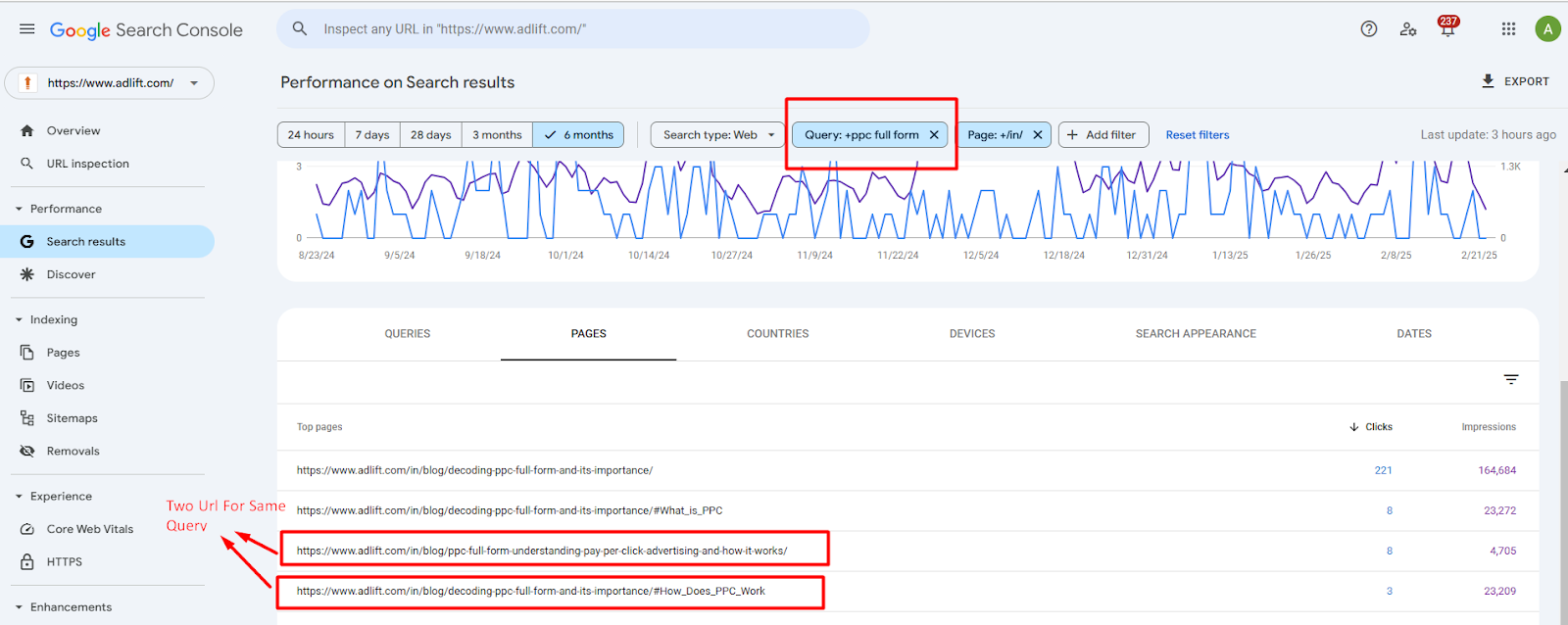Keyword Cannibalization: Why It Matters for Your Company and How to Avoid It

Everyone and their bosses are using SEO, but did you know that 94.74% of keywords receive fewer than 10 monthly searches? This makes ranking for the right keywords crucial for your business growth. Yet, you may be unknowingly sabotaging your SEO efforts through keyword cannibalization.
By creating multiple pages targeting the same keyword, businesses dilute their ranking power, confuse search engines, and lower their traffic potential. This blog will explain what keyword cannibalization is, how it impacts your SEO, and actionable strategies to fix and prevent it effectively.
What is Keyword Cannibalization?
Content keyword cannibalization occurs when multiple pages on a website target the same keyword or closely related phrases, forcing them to compete against each other. Instead of helping each other rank better, these pages undermine one another, weakening your SEO strategy.
How Search Engines Interpret It
When search engines like Google encounter multiple pages targeting the same keyword, they struggle to decide which page is the most relevant. This can lead to:
- Fluctuating rankings.
- Lower visibility for key pages.
- Demotion of your most important content.
How Keyword Cannibalization Hurts Your SEO
Keyword cannibalization is a silent yet significant issue that can drastically impact your SEO strategy. When multiple pages on your site target the same keyword, they end up competing against each other instead of collectively boosting your rankings. This weakens your site’s authority and confuses search engines, leading to suboptimal performance across various metrics. Below are key ways keyword cannibalization can hurt your SEO efforts.
Diluted Ranking Potential
When multiple pages compete for the same keyword, Google spreads the ranking power across all of them instead of consolidating it into one authoritative page. This fragmentation prevents any single page from fully dominating the search results.
Example:
Imagine a website with four separate blog posts targeting the keyword “best CRM software.” Instead of one strong page ranking higher in search results, the ranking power is diluted across all four pages. Consequently, none of the pages perform well. By consolidating these pages into a single, comprehensive resource, you can strengthen your site’s authority and improve its visibility for that keyword.
Lower Click-through Rate (CTR) and Traffic
Keyword cannibalization in SEO often results in multiple pages ranking for the same keyword but at lower positions. This not only reduces visibility but also fragments user engagement, as clicks are split between competing pages.
Why It Matters:
When your content is spread thin, it struggles to make a strong impact. Instead of dominating a higher-ranking position with one powerful page, you end up with several mediocre placements. This negatively impacts your CTR and overall traffic potential. A focused, well-optimized page will drive more clicks and engagement.
Internal Competition Confuses Google
When your website has multiple pages targeting the same keyword, Google struggles to identify which page is most relevant for a specific search intent. This confusion often leads to the incorrect ranking of less relevant pages or inconsistent rankings altogether.
The Result:
Your high-priority pages may lose visibility because Google fails to recognize their importance. This is particularly damaging for pages targeting high-value keywords or essential business objectives.
Wasted Crawl Budget
Google allocates a limited crawl budget to each website, meaning it only spends a finite amount of resources crawling and indexing your content. If your website has multiple competing pages for the same keyword, you waste valuable crawl resources on redundant content.
Impact:
This inefficiency slows down the indexing of more important pages, especially new or updated ones. Over time, this can lead to poor site performance and missed opportunities for ranking improvements.
Backlink Dilution
Backlinks are one of the most critical factors in determining a page’s authority and ranking potential. However, when multiple pages target the same keyword, the backlinks earned by each page are spread thin.
Why This Hurts SEO:
Instead of consolidating link equity to strengthen one authoritative page, keyword cannibalization disperses this valuable resource across several competing pages. This weakens the overall effectiveness of your backlink strategy and diminishes your domain authority.
How to Identify Keyword Cannibalization?
Use Google Search Operators
Google search operators can help uncover instances where multiple pages on your site rank for the same keyword. This method involves using the site: operator along with your target keyword to identify which pages Google associates with that term. It allows you to check how many of your URLs are competing for the same keyword and helps in determining whether keyword cannibalization is occurring.
Method:
Type site:yourwebsite.com “your keyword” in the Google search bar. This query reveals a list of pages from your website that are ranking for the specified keyword. Reviewing these pages can help you identify overlaps in content focus, allowing you to take corrective measures.
Analyze Google Search Console Data
Google Search Console provides valuable insights into your website’s performance in search. By analyzing search data, you can identify if multiple URLs are ranking for the same keyword, which could lead to cannibalization.
Steps:
- Open Google Search Console and navigate to the Performance section.
- Click on Search Results and filter the data by a specific keyword.
- Check for multiple URLs listed under the filtered keyword.
If you notice more than one page targeting the same keyword, you may need to consolidate or redefine their focus.
Conduct a Keyword Mapping AuditA keyword mapping audit is an essential process for organizing your website’s keyword strategy and ensuring that each page targets a distinct keyword or set of closely related keywords. This helps prevent overlapping content that could lead to cannibalization.Steps to Perform a Keyword Mapping Audit:- Create a spreadsheet to list all your site’s URLs and their corresponding target keywords.
- Review the list to identify any duplicate or overlapping keywords mapped to different URLs.
- Revise the content strategy for affected pages by assigning unique keywords to each URL or merging pages with similar topics.
This systematic approach ensures your keyword targeting remains structured and reduces the risk of internal competition.
Leverage SEO Tools
Advanced SEO tools can simplify the process of identifying keyword cannibalization by analyzing your website’s performance metrics and rankings.
Tools to Use:
- Ahrefs: The Site Explorer tool lets you examine keyword rankings for specific pages and identifies when multiple URLs are competing for the same keyword.
- SEMrush: The Position Tracking feature allows you to track keyword rankings across your site, making it easy to spot competing pages.
- Moz: By checking metrics like Page Authority and keyword performance, you can determine which pages have stronger ranking signals and decide which to prioritize or consolidate.
These tools also provide actionable insights, helping you optimize your site structure and keyword targeting strategy.
How to Fix Keyword Cannibalization?
Merge Competing Pages
If multiple pages target the same intent but have valuable content, consolidate them into one authoritative page.
Example:
A marketing agency has three blog posts on “SEO strategies.” By merging them into one comprehensive guide and redirecting the older URLs, they create a stronger page that ranks higher.Implement 301 Redirects
If a less important page is competing with a more authoritative one, redirect the lower-ranking page to the better-performing one.
Example:
A travel website has a page for “budget travel tips.” Redirecting a similar lower-ranking page boosts the authority of the stronger page.Canonical Tags
Use canonical tags to indicate the preferred version of a page when you need to keep similar pages.
Example:
An e-commerce site with multiple pages for different product variations (e.g., colors) can point to the main product page using canonical tags.Deoptimize Less Relevant Pages
If two pages compete but one is less important, adjust the content of the less significant page to target a different keyword.
Example:
A blog post and a product page both rank for “best laptops for students.” The blog post can be reoptimized to target “laptop buying guide for students.”Use Internal Linking to Reinforce Page Authority
Direct internal links from competing pages to the main page using anchor text that includes the target keyword.
Example:
A SaaS company can link multiple blog posts about CRM features to their main CRM product page using “best CRM software” as anchor text.Adjust On-page SEO Elements
Ensure each page has unique title tags, meta descriptions, and headings to differentiate its focus.
Preventing Keyword Cannibalization in Future SEO Strategies
Prevention is better than cure, and this is true, not just in regards to your health! Preventing keyword cannibalization is crucial for building an SEO strategy that delivers consistent and targeted traffic without internal competition. A well-structured plan helps maximize your rankings and ensures long-term success in search engine results.
Create a Keyword Mapping Strategy
Assign unique keywords to each page before content creation.
Example:
Digital Marketing Strategies: Main guide.
SEO for Startups: SEO-focused content.
Social Media Growth Tactics: Social-specific content.Regularly Audit Your Website
Perform keyword audits every 3-6 months using tools like Google Search Console, Ahrefs, or SEMrush to identify cannibalization issues early.
Use Topic Clusters
Organize content using a pillar and cluster model.
Example:
Pillar Page: “Ultimate Guide to Content Marketing.”
Cluster Pages: “SEO in Content Marketing,” “Social Media Content Tips,” “Content Marketing Case Studies.”Set Clear SEO Guidelines for Content Teams
Train your team on keyword strategy and provide an SEO playbook to prevent overlapping keywords in future content creation.
Powering Up Schneider Electric’s SEO: A 68% Surge in Organic Visibility
Schneider Electric aimed to improve the visibility of its global website, resolve keyword cannibalization issues, and strengthen its share of voice. AdLift stepped in with a strategic SEO approach to tackle these challenges effectively.
Key Challenges
- Identifying keyword cannibalisation and resolving internal competition
- Improving backlink profile and domain authority
- Strengthening on-page SEO for better global reach
The AdLift Approach
To address cannibalization in SEO, we implemented:
✔ Content keyword cannibalization fixes through strategic anchor text
✔ Backlink reclamation to recover lost authority
✔ Local on-page SEO optimizations for improved relevance
✔ Enhanced internal linking to strengthen site structureResults
📈 68% increase in organic visibility
🏆87% growth in top 3 keyword rankings
📊1433% improvement in industry keyword rankings
📌40% boost in Ahrefs ranking
🔗8% increase in linking domainsBy applying best practices and focusing on how to fix keyword cannibalization, we helped Schneider Electric achieve long-term SEO improvements, strengthening its digital presence globally.
Lift Your Rankings With AdLift
Keyword cannibalization can hold back your website’s true potential by causing internal competition and diluting your search rankings. By identifying and resolving cannibalization issues using tools like Google Search Console, SEO software, or keyword audits, you can streamline your content strategy and ensure each page performs at its best. With AdLift’s expertise, you don’t have to face these challenges alone.
Our team specializes in optimizing content structures, boosting organic visibility, and delivering measurable results. Let AdLift help you elevate your SEO game, ensuring your content works together, not against itself. It’s time to lift your rankings and unlock growth!


